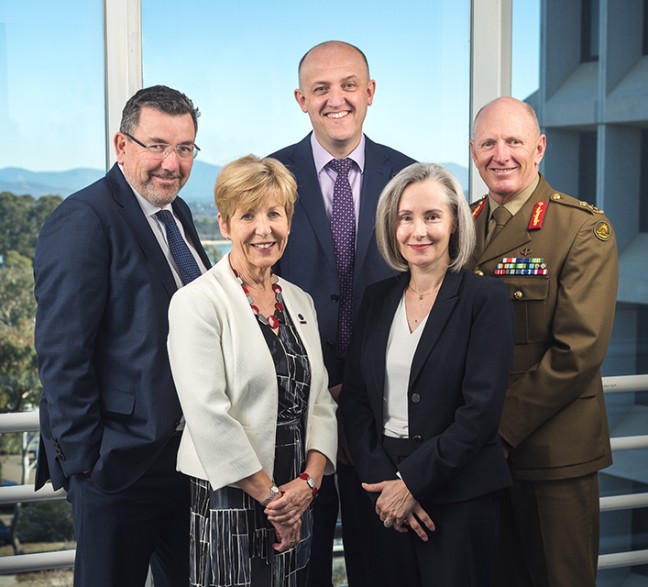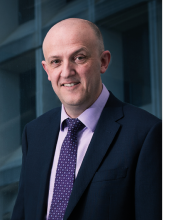Director-General's Introduction
I am pleased to present the 2019–20 Australian Signals Directorate (ASD) corporate plan, which covers the period 2019–20 to 2022–23, as required under section 35(1)(b) of the Public Governance, Performance and Accountability Act 2013.

ASD Leadership team left to right: Simeon Gilding - Deputy Director-General Sigint and Network Operations, Hazel Bennett - Deputy Director-General Corporate and Capability, Mike Burgess - Director-General ASD, Rachel Noble PSM - Head Australian Cyber Security Centre, LTGEN John Frewen DSC, AM - Principal Deputy Director-General.
Every morning, as I enter ASD’s headquarters, I receive a reminder of who we are, what we do and – most significantly – why we do it. I walk past an Enigma machine from World War Two. The famous encryption device is a symbol of our origins, and of our mission: to reveal our adversaries’ secrets while protecting our own.
ASD is today undergoing perhaps the most significant transformation since we were established all those decades ago. In our second year as a statutory agency, we are experiencing significant internal change, while we continue to deliver on our key missions – providing foreign signals intelligence, cyber security, and offensive cyber operations in support of the Australian Government.
Our highest priority has, and will always be, the protection of Australian lives – whether that is supporting Australian warfighters, detecting terrorist threats against Australian interests, or providing intelligence to ensure Australians are safe when overseas.
Yet we are mindful of major shifts in the strategic landscape, including security and stability across the Indo-Pacific.
We face a rising threat to our national security, economic prosperity and social wellbeing from foreign interference and espionage, including by state-based actors in cyberspace, and by cyber criminals. We are a foreign intelligence agency, and a key focus for us is ensuring our capabilities remain effective and well postured for significant events, such as a cyber or terrorist attack. Our capabilities are not directed at ordinary Australians.
Technology sits at the heart of our business. We master technology to identify and disrupt threats, and protect Australian interests. At a time of rapid change in the technology environment, we also have an important role as a trusted adviser to government on how best to navigate major technology and strategic shifts.
Our people are the key to mastering technology. We have some of the best and brightest people, who come from all sorts of fields – from computer science to marketing, international relations, law, linguistics, music, and mathematics, among others. ASD places an enormous emphasis on diversity – we desire and require a diversity of people with a diversity of skills. Over the next few years, ASD will be recruiting hundreds of people to be part of our team.
Our foreign intelligence and cyber security functions come with special responsibilities. ASD takes these responsibilities very seriously, and is committed to operating within the spirit and the letter of the law. We have built this commitment into the culture of our organisation, through the ASD values. And ASD staff uphold these values in every aspect of their day-to-day work.
It is important that the public understands why our work is necessary to defend Australia from global threats and, most importantly, that we always act legally and ethically. In the past year, ASD has been more transparent about our role. Details of our operations and capabilities will need to remain classified – but I am committed to ensuring that Australians understand more about what we do, and why we do it.
My vision is that ASD remains a world-leading foreign signals intelligence and cyber security agency, enabled by talented, dedicated people, leading-edge capabilities, strong partnerships, and with the trust of the Australian public.
This plan describes the steps we will take to enhance that vision in 2019–20, and out to 2022–23 and beyond.

Director-General
Australian Signals Directorate